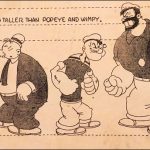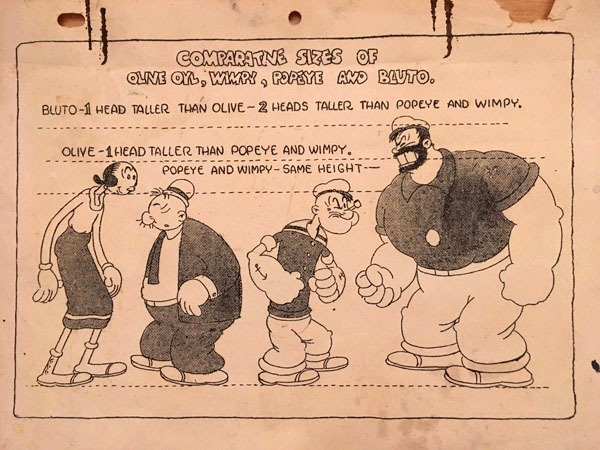

The Popeye series continued to be increasingly popular with the distributors. In fact, there have been claims it was out-performing the Mickey Mouse series – one might have to study the trade publications of the day to see if this was really so. Some feel the cartoons may have been formula, but the public was eating it up, like so many spinach rolls.

We Aim To Please (12/26/34) – Popeye and Olive open up a diner, but Olive thinks another corner has better traffic – so Popeye pushes the whole structure down the block to the more lucrative location. However, there are still freeloaders to be found, as J. Wellington Wimpy gets to use his “gladly pay you Tuesday” routine for the first time on film. Bluto follows suit, while Olive makes sandwiches in the manner of shuffling a deck of cards – the first of many times she would perform this feat during her career. When Bluto refuses to pay, the battle is on, and Popeye settles the bill by rendering Bluto into “a lot of Baloney” on a meat hook. A memorable original title song (which I suspect is written by Timberg and Scholl), opens and closes the film (with such memorable lines as “Onions are beautiful things” – tell that to Friz Freleng.) Also included are revisits for “With My Eyes Wide Open, I’m Dreaming”, and “Narcissus”.
Beware of Barnacle Bill (1/25/35) – Popeye visits Olive, but finds she is anticipating a visit from Barnacle Bill the Sailor (conveniently type-cast as Bluto). This allows Olive and Popeye to spend considerable footage in choruses of the famous song, previously used in Betty Boop’s second Talkartoon, modified to allow Popeye to take several of Bill’s verses as his own derogatory choruses against the perceived merits of the rival suitor. Bill arrives on cue, ready to break down the door as called for by the original song lyrics, and the battle lines are traditionally set. Upon Bill’s ultimate defeat, Olive changes her affiliations, and asks Popeye the question, “When can we get married?” This time, it is Popeye, not Bill, who walks out on her, jilting her proposal on suspicion that she will be just as fickle to him as she just proved herself to be in dumping poor ol’ Barnacle Bill. Olive breaks into temporary tears on Popeye’s departure, bemoaning, “There goes the navy”, but perks up to a salute when she realizes in her traditional changeable fashion, “But there’s still the army!” Aside from the specialty lyrics added to “Barnacle Bill the Sailor”, the score also includes the traditional “Sailor’s Hornpipe”, “Blow the Man Down”, and the ever-present “Stars and Stripes Forever”, which was becoming a traditional cue for whenever the climactic spinach-powered fight began.
Be Kind to Aminals (2/27/35) – For reasons unknown, Popeye receives in this cartoon possibly his worst voicing ever, performed by Floyd Buckley, a Broadway actor who had appeared in several Rodgers and Hart shows, and who at the time was serving as Popeye’s voice for the radio show of the same name. The substitution is largely unexplained. Billy Costello was known to have placed unreasonable demands at some point upon Fleischer for higher compensation, which Fleischer ultimately refused. However, Costello’s voice continues to appear in several titles released after this production, so this may have been too early chronologically for the schism to have taken place. Perhaps the film served as a bargaining chip – possibly Costello absented himself from the recording date, and Fleischer retained Buckley temporarily just to spite him, and show he could get along without Costello’s services if necessary. To be quite frank, the performance of Buckley would tend to demonstrate that Costello would win this argument, and was badly needed indeed. However, neither of the bickering parties probably knew at the time of Jack Mercer waiting in the wings, whose vocal talents would soon prove to both Costello and Max that all bets were off.
“A preachment dear friends you are about to receive”, might be an appropriate summation by Red Ingle of this episode, centering on one of Max’s favorite subjects. Popeye and Olive are feeding the birds in the park. They see a horse pulling a too-full wagon loaded with produce, being whipped by Bluto. The load, including both bananas and spinach, is more than the horse can handle. Popeye plants himself on the horse’s back to take the whip blows (an act that does not endear him to Bluto, but does befriend him to the horse). Olive slips and slides on banana peels, until Popeye finds the spinach in the wagon. The rest goes as usual, with Bluto winding up in harness, and the horse with the whip. (Nearly te same plot would be visited by Fleischer again in a later Betty Boop entry, to be discussed in a subsequent article.) A new musical selection, “Take a Lesson From the Lark”, is heard during the bird-feeding sequence, a 1934 pop song recorded by Ted Hanson and his Normandie Orchestra on Bluebird (possibly a shipboard orchestra?), Tod Rollins on Melotone, Perfect, et al., and Nat Brusiloff on radio transcription. Another newcomer melody is “The Last Round-Up”, a 1933 pseudo-country Western song written by New Yorker Billy Hill. Recordings included two dance versions on Brunswick by Victor Young and Guy Lombardo, and a vocal hit on the same label by Bing Crosby (below), among his first sides in the Western vein. Victor had a dance version by Don Bestor, and also a concert vocal by Conrad Thibault. Columbia had 10″ and 12″ records, both by George Olsen and his Music (the 12″ version was coupled with Ben Bernie’s version of “Who’s Afraid of the Big Bad Wolf?” Melotone and Perfect had Will Osborne as a dance record, and a vocal by Gene Autry for the country market. In later years, the song was revived by Vaughn Monroe in 1941 for Bluebird (presented in an uncharacteristic and surprising killer-diller swing arrangement), and in purely traditional fashion by the Sons of the Pioneers for RCA Victor single and also in stereo on one of their later RCA albums.
Pleased to Meet ‘Cha (3/12/35) – Olive has a couple of callers (the usual duo). Olive warns Popeye and Bluto to be on their best behavior (yeah, sure). They decide to show off “tricks” to see who stays – which usually wind up with a fist in someone’s eye. Olive reacts with hilarious laughter, until she realizes the collateral damage that is being caused to her house. Eventually, Bluto is ejected and dejected, while Popeye uses Olive’s carpet to flip all the furniture back into the right places. The musical score is only a bunch of old friends: “Love is Just Around the Corner” (below), “Love thy Neighbor”, “Take a Number From One to Ten”, and “The Man on the Flying Trapeze”.
The Hyp-Nut-Tist (4/26/35) – Popeye and Olive go to the theater, where “The Hypnotist” (unnamed, but looking precisely like Bluto) is appearing. Popeye is skeptical of the whole business, but Olive seems to be stuck on the guy. Olive is coaxed up on the stage, where she is hypnotized to think she’s a chicken. She crows like a rooster, but literally lays an egg. When the hypnotist crosses over the line in his treatment of Olive, Popeye dashes onto the stage, (Is this where Will Smith took his cue?) The hypnotist tries to change Popeye into something embarrassing, but Popeye uses a stage mirror to cast the hypnotic bolts back at their source. The one-eyed sailor manages to snap Olive out of it before the iris out, which takes an unusual form that Fleischer seemed to remember for the early 1940’s. The camera moves in closer and closer to the bowl of Popeye’s pipe, and he toot-toots it just before the iris out. In the last round of Fleischer-produced Popeyes in the 1940’s, Fleischer would basically run this idea in reverse for his opening credits, starting with the toot-toot, then pulling back to reveal the sailor. Songs: “A Little White Gardenia”, introduced by Carl Brisson in the Paramount feature “All the King’s Horses”. It was recorded by Brisson on Brunswick. Hal Kemp did a dance version for Brunswick, while Raymond Paige performed the same function for Victor, Henry King & his Orchestra, vocal by Joe Sudy (below), for Columbia; and Art Kassel got it for Bluebird. Also included is another swing with “The Man On the Flying Trapeze.”
Choose Your Weppins (5/31/35) – Popeye and Olive run what appears to be a pawn shop. Olive busies herself in her spare time in a game of mumbly peg with a set of knives. A new villain, slick and moustached, escapes arrest by officer Wimpy, grabs a box of knives from behind the counter of Popeye’s shop, and tries to pawn them to Popeye as his own. He wants ten dollars, while Popeye insists, “Fifty cents”. And so the battle begins, with plenty of “pointed” threats, The script would receive coverage in rint as a “Big Little Book” during the period. Song score unfortunately consists of traditional repeats of “The Prisoner’s Song”, “Pizzicato Mysterioso”, and Liszt’s “2nd Hungarian Rhapsody”.
For Better or Worser (6/26/35) – Bachelor Popeye tries to fend for himself with home cooking, and realizes the effort is a total loss. “It’s no use. I has to get a wife.” (I guess Door Dash was too far in the future to be a viable alternative.) He visits a matrimonial agency, and selects a photo off the wall, face unseen, for a prospective bride. Bluto, however, is in the marked for a Missus at the same time, and makes the same selection. It is of course Olive, who attempts to doll herself up with her make-up kit – converting her face into a living nightmare. Under cover of veil, she appears her suitors, who engage in the usual battle of brute strength to drag her to Justice of the Peace Wimpy. To the victor belong the spoils – but not when Popeye sees what’s underneath the veil. He high-tails it back to his bachelor pad, and drowns himself under the product of his boiling-over stewpot, for the iris out. The musical featured newcomer is “Stay as Sweet as You Are”, the big ballad from “College Rhythm”. It was recorded by Lanny Ross for Brunswick, and for dancing by Little Jack Little on royal blue Columbia. Jimmie Grier produced rival edition on Brunswick, and Archie Bleyer (better remembered for a string of hits in the 1950’s) on Vocalion. In England, Lew Stone waxed it for Regal Zonophone, Harry Roy on Parlolphone, and Ambrose for Decca. Revivals included Frankie Laine on Mercury, Don Cornell on Coral, and Nat King Cole on Capitol The Wedding March from Lohengrin is also featured, in a delightfully clunky, off-key rendition punctuated by honks from the brass section, as Bluto marches Olive down the aisle. “Home Sweet Home”, “Love Is Just Around the Corner”, and “Take a Member From One to Ten” also appear.
I will skip over several titles from the series that do not feature new numbers from pop music or original compositions, and jump to King of the Mardi Gras (9/26/35). A wonderful performance by basso Gus Wickie as Bluto – showing off his pipes with a memorable title number original to the production, written by Sammy Timberg and Bob Rothberg. Bluto is a strong man at Coney Island, who considers himself “The whole bloomin’ show”. Popeye (the debut of Jack Mercer) as usual winds up in competitive feats to show the braggart up, and an epic battle moves to the venue of a mammoth roller coaster, with Popeye caught in the tracks until his leafy green is consumed to save the day.
Next time: Screen Songs 1935-36: Bring on the Bands.

